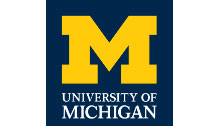This job has Expired

Assistant Research Scientist in Hydrology
Job Description
How to Apply
Applications are welcomed and encouraged from all qualified individuals regardless of background and identity. Applications should include (1) a cover letter addressing your specific interest in the position and relevant experience and qualifications; (2) CV; (3) a personal statement describing your vision and plans for research and stakeholder engagement (3-page maximum); (4) a statement on how you have or plan to contribute to issues of diversity, equity, inclusion, and justice (1-page maximum); and (5) a list of three academic references with contact information.
For assistance or for more information, please contact Greg Dick, Director of CIGLR, at gdick@umich.edu.
Summary
The Cooperative Institute for Great Lakes Research (CIGLR) is seeking applications for a full-time Assistant Research Scientist in Hydrology. You will lead CIGLR’s research to link hydrologic, hydrodynamic, and land processes (including ecology) in model systems to study and predict the water cycle over various spatial and temporal time scales. Short-term applications will include forecasting (hours, days) of coastal, fluvial, and pluvial flooding, the modeling of complex processes that contribute to total water level (i.e., sum of water level, surge, and waves) and their interactions. On longer timescales, applications include subseasonal-to-annual water predictions and quantifying uncertainty associated with these predictions. In all cases, water predictions will be used to inform state, municipal, and other decision makers.
In collaboration with the National Oceanic and Atmospheric Administration (NOAA) Great Lakes Environmental Research Laboratory (GLERL) and the School for Environment and Sustainability (SEAS), you will join a large interdisciplinary team at GLERL, CIGLR, and SEAS that is developing the next generation prediction system for water levels in the Great Lakes. This new system will provide the foundation for defining risk of coastal inundation impacts across subseasonal to annual time scales for the Laurentian Great Lakes.
Your appointment will be with CIGLR, which is part of the University of Michigan’s School for Environment and Sustainability (SEAS), located in Ann Arbor, Michigan. CIGLR is a partnership between the University of Michigan and NOAA that brings together experts from academia and government research labs to work on pressing Great Lakes environmental challenges. You will spend the majority of their time at GLERL in Ann Arbor and will collaborate closely with colleagues at CIGLR, GLERL, and SEAS. CIGLR Research Scientists serve as principal investigators and work closely with GLERL investigators to develop new NOAA-supported research projects, oversee execution of ongoing projects at the Institute, and secure project funding from other external sponsors.
The position comes with a guarantee of full-funding for the initial appointment of three years. After three years, the position will be primarily supported by projects co-developed with NOAA GLERL, our main sponsor.
Hybrid and flexible work agreements may be made to allow for partial off-site work at a remote location.
Mission Statement
The School for Environment and Sustainability (SEAS) overarching mission is to contribute to the protection of the Earth's resources and the achievement of a sustainable society. Through research, education, and outreach, the faculty, staff, and students are devoted to generating knowledge and developing policies, techniques, and skills to help practitioners manage and conserve natural resources to meet the full range of human needs on a sustainable basis. To learn more about the SEAS’s mission and activities, please visit www.seas.umich.edu.
The University of Michigan is consistently ranked among the top American public research universities, and Ann Arbor is routinely ranked as one of the best places to live in the U.S. due to its affordability, natural beauty, preservation of wooded areas, vibrant arts program, and lively downtown.
SEAS and CIGLR are committed to creating an inclusive and equitable environment that respects diverse experiences, promotes generous listening and communication, discourages and genuinely respond to acts of discrimination, harassment, or injustice. Our commitment to diversity, equity and inclusion is rooted in our values for a sustainable and just society.
Why Work at Michigan?
In addition to a career filled with purpose and opportunity, The University of Michigan offers a comprehensive benefits package to help you stay well, protect yourself and your family and plan for a secure future. Benefits include:
Generous time off
A retirement plan that provides two-for-one matching contributions with immediate vesting
Many choices for comprehensive health insurance
Life insurance
Long-term disability coverage
Flexible spending accounts for healthcare and dependent care expenses
Required Qualifications*
Candidates must have a PhD in hydrology, civil and/or environmental engineering, or related fields. Candidates are expected to have a strong record of publication and the capacity for effective collaboration across disciplines with colleagues at CIGLR, SEAS, and GLERL. Candidates should also have strong experience in the following:
Hydrological modeling, including analysis of hydrological datasets such as those for precipitation, evaporation, and runoff
Computation, including, proficiency in working with high performance computing systems (e.g., shell scripting, programming, submitting a batch job) and proficiency in Python, R, or similar programming languages
Model coupling; for example, linking hydrological or hydrodynamic models with wave models; linking coastal hydrodynamics models with watersheds, river mouths, floodplains
Quantifying model uncertainty
Numerical modeling
Ability to effectively collaborate with diverse experts at CIGLR, SEAS, and GLERL, and other partner agencies/institutions/organizations
Ability to effectively communicate, supervise and mentor employees and students and provide scientific leadership of an interdisciplinary team
Application Deadline
Job openings are posted for at least seven calendar days. This job may be removed from posting boards and filled any time after the minimum posting period has ended.
Applications will be reviewed as received throughout the posting period and continue until the position is filled.
U-M EEO/AA Statement
The University of Michigan is an equal opportunity/affirmative action employer.
U-M COVID-19 Vaccination Policy
COVID-19 vaccinations, including one booster when eligible, are required for all University of Michigan students, faculty and staff across all campuses, including Michigan Medicine. This includes those working remotely and temporary workers. More information on this new policy is available on the U-M Health Response website or the UM-Dearborn and UM-Flint websites.
*Please mention you saw this ad on AcademicJobs.*




